All the other bloggers writing about the rise of the Chinese Super League do it from afar. We wanted to check out the scene first hand. Welcome to your first primary research blog post about Football in China.
—
Walking around Beijing, there are no clues that there is a Football club at all. Nobody is wearing the jerseys, there is no colourful graffiti, no ultra stickers slapped onto lampposts. Any self-respecting German Football loon will go out of his way to advertise. Bridges crossing the autobahn are tagged. Young boys run around in club colours. Eye-catching Aufkleber designs are the city confirm who run the joint.
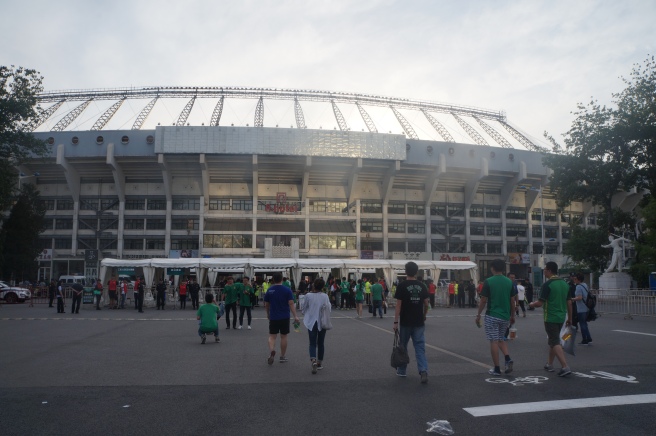
Not here. There is nothing around the city that tells you that Beijing Guoan exists.
Prior to game day I saw 2 people wearing club merchandise, but nobody seemed to know how to get a ticket. Receptionists, tourist information officers, no one. I had to pay a visit to the club shop at the Workers’ Stadium itself a couple days before. Now, in China, sports stadia feature many other facilities than just a ticket office, bar and toilets. A better word would be “entertainment venue”. Staircases up into the round bowls are punctuated with a whole manner of commercial side-shows; sports shops, breweries, hair salons, Japanese restaurants, games arcades. This tells us that 90 minutes of Football is not enough to convince many to come to the games; restaurants and shops help “make a day of it”, for right or for wrong.
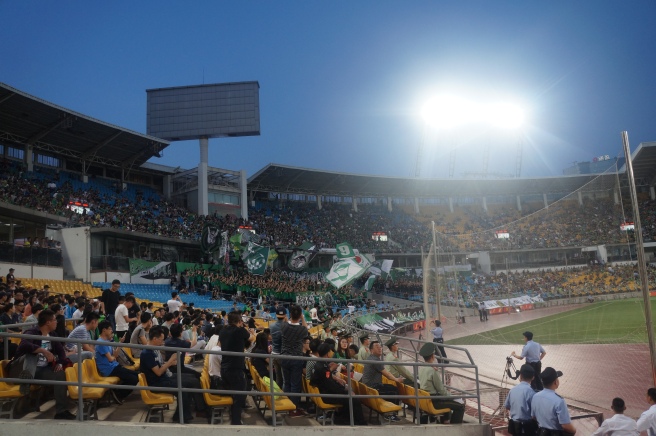
The receptionist at the club shop and I did not share a language, but to my fortune entered a young man that the receptionist barked at to help me. He addressed me in comfortable English and asked my concern.
Turns out meeting this young man was a stroke of ridiculous luck. He worked for the club directly with the players and managers, and his excellent command of English had come from a spell working with one of England’s major clubs with excellent Football heritage, both domestic and in European competition, sadly underachieving nowadays (work it out). He had come back to work for his home town club. He knew my club well and asked about my fan experiences. I asked about the match atmosphere here and he said it was actually pretty good. The ticket window now closed, I said I would return early the next day, but, after a pause, he said he could score a free-ticket. Over the moon at this generosity, we exchanged numbers.
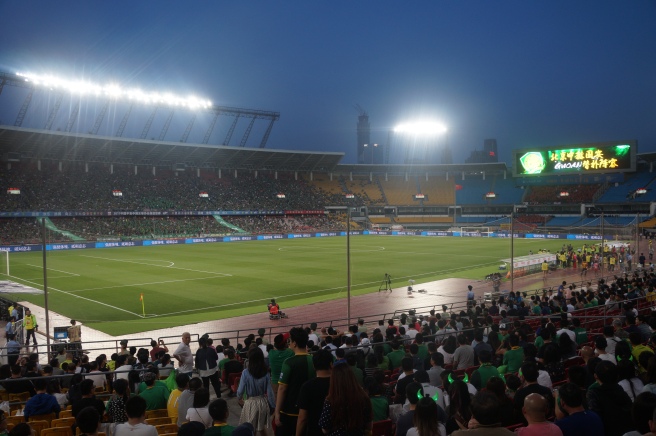
I got the rendevouz information; 6pm at the East Gate. Closer to game time and I was relieved to see thousands of men, women and children decked out in the rather dashing lime green and yellow of Guoan. Clearly there was a taste for Football in Beijing, even if the fans are not expressing themselves much outside of game day. We will return to the topic of identity-expression in China in future posts, but for now we will simply say that the Chinese do not spend as much time exploring their own personal identity as much as Westerners do. My contact had indeed found a free-ticket, but had also purchased me a Guoan scarf to wear during the game. I was lost for words; such kindness left a great impression on me.
So it was now time to get the first glimpse of Chinese Football fan culture. We have all quietly watched excessive transfer window behaviour, but what would the fans be like?
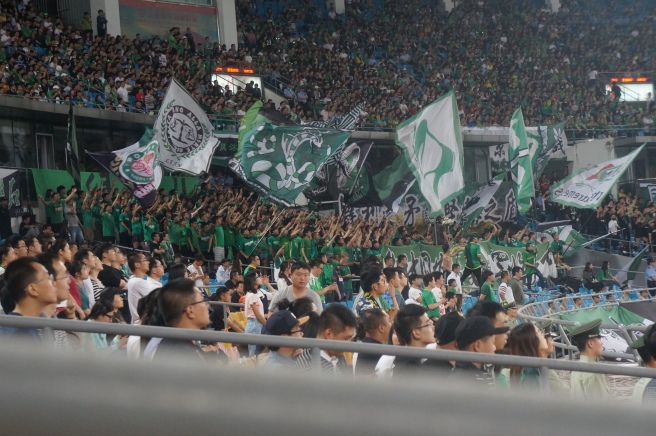
First of all, it is clear where fans in Beijing take their inspiration from. The banked curve behind the goal at the North End houses an Ultras group, wearing matching coloured shirts, waving giant custom flags and taking instructions from a Capo. They sing, they bounce, they clap, they raise their arms, all in unison. We see this style of support spreading a lot; the success of the Ultra Model compared to South-American or British style support is that it is easier to share images of this support culture on social media. Giants flags, section-bouncing and smoke bombs make better Instagram photos than a group of lads from Mendoza or Manchester singing raucously. Thus new fan groups looking for inspiration look more to Italy and Germany than to Argentina and England. The story of Globalisation is the story of Homogenisation, also in Football.

However, Beijing Guoan has more than one “Ultra Group”. It has 3. The North Bank holds one, the East Stand has another (by far the most numerous) and the upper tier of the West Stand has the smallest. The groups would not always chant in unison; they would frequently do their own thing. All had a Capo and drummers. My companion during the game explained to me that the North Bank group were the most powerful. They were apparently more political (what this exactly means we don’t know) and certainly had a higher proportion of young men among their ranks. I couldn’t make out the demographics of the East Stand group, being far away, but the West Stand group behind me did have several middle-aged women. This is why we write “Ultra Group” in speech marks; these fans probably call themselves Ultra, but I think others in Poland, Sweden and Bulgaria wouldn’t. Not just yet.
At kick-off, there was the now seemingly compulsory sea of scarves you see in many places, but it was accompanied with shinning smartphone torches. This is a custom we have seen employed by Middlesboro possibly most famously (please correct me in comments if you know a better example), but the tech-savy Chinese have also found it a good way to add a little something to their atmosphere. Good to see them playing to their strengths. Regarding chants, it seems the same old tunes, songs and rhythms are being used as the basis for chanting and drumming, but in dogmatic (very German) fashion, it is only the Ultras singing. The more passive fans do not take it upon themselves to proactively build the atmosphere, the opposite of English fan behaviour.
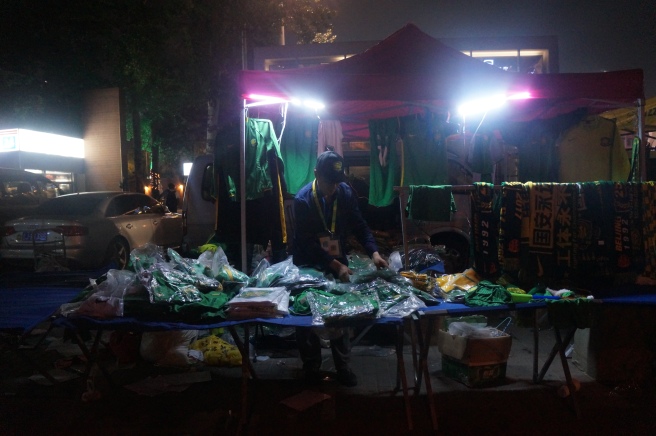
Hebei Fortune, Manuel Pellegrini’s current nest egg and neighbours to Beijing Guoan, won the game 4-1 after being a goal down thanks to a penalty. The away support was very good. The Hebei lot were extremely numerous, probably somewhere around 2,000, and sung and bounced throughout, though such a large open stadium made them difficult to hear. The game itself has the hallmarks of players who lack dexterity of the feet but playing structured, intelligent Football. It will require time for China to develop such instinctive and ball-controlling midfielders and strikers, but investment in the supporting infrastructure is the best way to creative an environment that breeds attractive, effective Football.

read or write for Wild East Football! We are here on the ground, not ‘afar’ as you say…..
LikeLike
Hey Richard. Firstly thanks for the follow and the comment. Glad you liked it. Second, sure. We’d love to do some guest writing. Drop us an email at fbtg@hushmail.com and we will be in touch.
LikeLike
hey, I am not sure what your interests are in terms of Chinese football but if you email Cameron (founder of the website I’m sure he’ll be interested) cameron@wildeastfootball.net (if you want to CC me its richardwhiddington@hotmail.com)
Best,
Richard
LikeLike